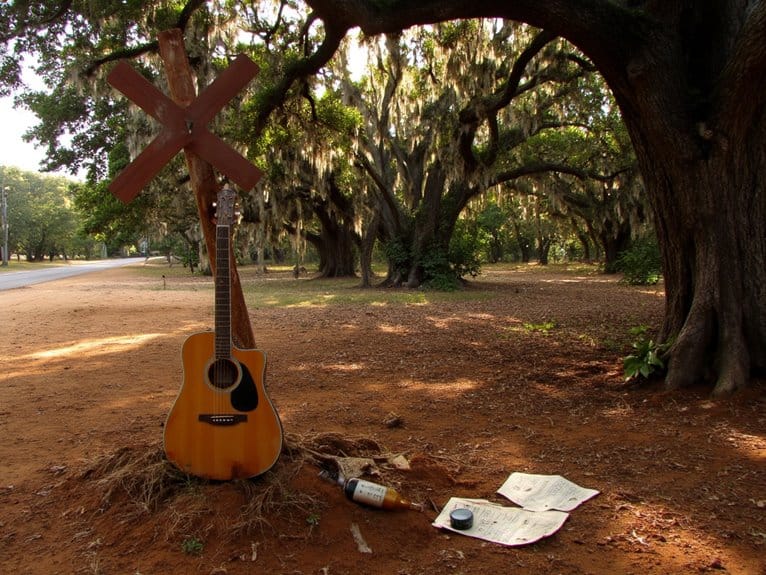The Mythology of Blues – Robert Johnson: Legend and Reality
You’ve likely encountered Robert Johnson’s crossroads devil legend, but the reality reveals a dedicated musician whose 29 recordings revolutionized popular music through intricate fingerpicking techniques and haunting vocals that captured Depression-era African American struggles. While his family emphasizes practice over supernatural intervention, and the devil myth originally belonged to Tommy Johnson, Robert’s brief two-session career produced foundational texts for rock, blues, and gospel that influenced everyone from Chuck Berry to Eric Clapton, transforming him from Delta obscurity into the Rock and Roll Hall of Fame’s “first ever rock star.” The complete story behind this transformation uncovers fascinating details about musical genius versus mythmaking.
We are supported by our audience. When you purchase through links on our site, we may earn an affiliate commission, at no extra cost for you. Learn more.
Notable Insights
- The crossroads devil myth was originally attributed to Tommy Johnson, not Robert Johnson, highlighting folklore’s fluid nature.
- Johnson’s family emphasizes his musical dedication and practice over supernatural explanations for his extraordinary guitar skills.
- Only 29 recorded songs formed Johnson’s entire legacy, yet revolutionized blues and influenced rock music’s foundation.
- Johnson evolved from obscurity during his lifetime to posthumous recognition as the “first ever rock star.”
- His intricate fingerpicking techniques and emotional depth captured Depression-era struggles, creating universal musical truths.
The Crossroads Devil: Separating Myth From Musical Mastery
When you hear the name Robert Johnson, there’s a good chance the first thing that comes to mind isn’t his disciplined practice sessions or musical training, but rather that infamous tale of a midnight deal with the devil at a Mississippi crossroads.
You’ve probably encountered this story through films like *Crossroads* or countless retellings that emphasize supernatural narratives over documented facts. The crossroads symbolism runs deep in African American folklore, representing places of decision and spiritual encounter, which helped cement this particular myth in popular consciousness.
However, Johnson’s family tells a different story—one where he spent eighteen months practicing with Ike Zimmerman in quiet cemeteries, developing his skills through dedication rather than demonic intervention. Interestingly, this devil legend was originally associated with Tommy Johnson, another blues musician, before becoming posthumously attached to Robert Johnson’s story.
Johnson’s entire musical catalog consists of only 29 songs, making his profound influence on blues and rock music all the more remarkable given such limited recorded output.
Twenty-Nine Songs That Changed Music Forever
Robert Johnson’s legacy extends far beyond the crossroads mythology, residing instead in a broader musical revolution that encompasses twenty-nine recordings that fundamentally altered the trajectory of popular music.
You’ll find his pioneering techniques echoing through every major innovation that followed, from Chuck Berry’s “Maybellene” crystallizing rock and roll’s foundation to Elvis Presley’s “That’s All Right” bringing blues to mainstream audiences.
I’ve traced these connections through decades of musical evolution, watching Johnson’s delta blues DNA surface in unexpected places.
His cultural impact resonates through Sam Cooke’s civil rights anthems, Ray Charles’ gospel-blues fusion, and even modern sampling techniques. The transformation becomes particularly evident when examining how artists like Aretha Franklin channeled blues intensity into “Respect” during the pivotal year of 1967.
These twenty-nine songs didn’t just change music—they established the blueprint for everything you hear today. The evaluation of such transformative music faces the subjective nature of determining what truly constitutes historical significance in musical expression.
From Delta Obscurity to Rock and Roll Hall of Fame
How does a poor musician from the Mississippi Delta, whose entire recording career spanned just two sessions and twenty-nine songs, ascend to become what the Rock and Roll Hall of Fame calls “the first ever rock star“?
You’re witnessing one of music’s most remarkable transformations from obscurity to legend.
Johnson’s Delta Influence remained dormant until the late 1950s blues revival rediscovered his recordings, introducing his raw emotiveness to musicians like Eric Clapton, The Rolling Stones, and Bob Dylan.
His Musical Legacy transcended genre boundaries, with complex guitar techniques and haunting vocals becoming blueprints for rock music’s evolution.
Johnson’s intricate fingerpicking and otherworldly voice created the sonic DNA that would eventually birth rock and roll.
What strikes me most isn’t his posthumous fame, but how twenty-nine songs recorded in makeshift studios became foundational texts for modern music, proving that artistic greatness doesn’t require commercial success during one’s lifetime. His lyrics captured the harsh realities of African-American life in the Depression-era South, transforming personal struggles into universal truths that continue to resonate today. Johnson learned from Mississippi Delta blues legends like Willie Brown, Charley Patton, and Son House, who helped shape his distinctive style.
On a final note
You’ve seen how Robert Johnson’s legend outgrew his reality, transforming twenty-nine recorded songs into rock’s foundational mythology. While the crossroads devil story captivates our imagination, Johnson’s true genius lies in his innovative guitar techniques and haunting vocals that influenced generations of musicians. His brief recording career, spanning just two sessions, created a blueprint for modern blues and rock that continues resonating today, proving talent transcends supernatural folklore.






